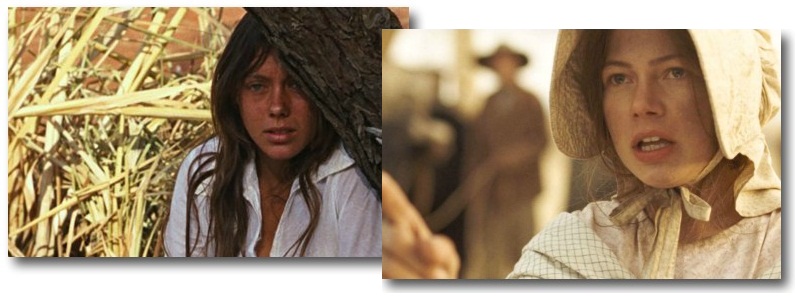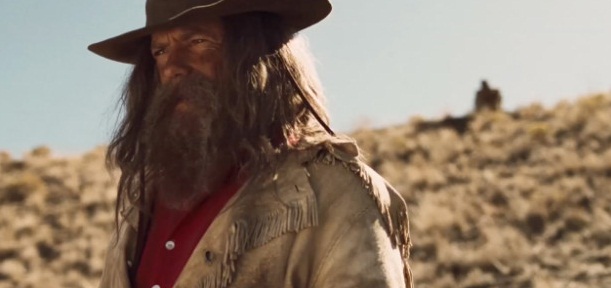Distant Relatives: Walkabout and Meek's Cutoff
 Friday, January 13, 2012 at 9:30AM
Friday, January 13, 2012 at 9:30AM Robert here w/ Distant Relatives, exploring the connections between one classic and one contemporary film.
 Jenny Agutter in "Walkabout" and Michelle Williams in "Meek's Cutoff"
Jenny Agutter in "Walkabout" and Michelle Williams in "Meek's Cutoff"Western people have something of a parasitic relationship with nature. But that's okay. If Werner Herzog is to believed, nature doesn't much like us either. The two films we look at this week, Nicolas Roeg's Walkabout and Kelly Reichardt's Meek's Cutoff look at the relationship of people trapped within the land and how it compares to their relationship with people of the land or who represent the land in their foreignness and threat to those considered 'civilized.' Along the way issues of trust, understanding, innocence, power, gender and whether one can overcome the attitudes and beliefs into which they're boxed, are encountered along with predictably arrid conditions.
Walkabout starts to roll when a teenaged girl and her younger brother (Jenny Agutter and Luc Roeg) are violently abandoned in the Australian outback. They wander lost for a good deal of time until they encounter an Aborigine (David Gulpilil) who becomes something of their guide despite the great distance in culture and understanding between the three. Meek's Cutoff follows a wagon train lost on the Oregon Trail. Of no help is their wilderness guide Stephen Meek (Bruce Greenwood), though of some help may be an Indian they've captured. Leading the contingent to trust in and follow their captives lead, though more out of desperation than principle is one woman, Emily (Michelle Williams).

Both films could be read as tales of reversal of fortune where individuals from the intruding aggressor class find themselves at the will of someone they consider strange and savage...
Questions of Trust and Gender after the jump.
The immediate question of trust arises: How could you trust your safety to someone who, if the roles were reversed, has history to prove that their safety would not be allowed. In this intepretation the children of Walkabout and the settlers of Meek's Cutoff make interesting representatives of the invasive species of Western white man. The children are fairly innocent and naive and the settlers aren't painted as particularly hawkish (except for the impotent Meek). Still, this may be the point. The most innocent of a society suffer for the reputations of the most guilty. Or maybe it's beside the point, and innocent or not, the children of such a culture still deserve to answer for it.
Roger Ebert, writing about Walkabout, suggested that the city dweller/noble savage juxaposition was a surface theme at best, calling the film ultimately about "the mystery of communication." And so is Meek's Cutoff, a film where almost all of the communication transpires in hushed whispers. The inability of the settlers and children to communicate with those who might help them, to be trapped in a state of perpetual confusion, misunderstanding and ignorance is nothing less than akin to wandering through the wilderness. Children are puzzled and grown adults are reduced to children when communication cannot save them. Though it's worth noting that ultimately this hump is crossed with greater ease by the children than the adults.

Then there is the issue of gender and sexuality. It may seem unusual to compare the politics of a film that famously lingers on the nudity of it's teenage actress to one that has significant feminist undertones. However both films are set in worlds of repression and narrow sexual norms, where breaking free of this, either through the exposure of one's physical self or the exposure of one's steadfast tenacity eventually causes great stryfe. Both films juxtapose a world of 'civizlied' sexuality against a culture of more natural (or at least more naked) sexuality and the result is a blossoming of two very different sides of femininity, one where a girl turnes, almost spontaneously before our eyes, from a child into a being of sexual power, and another where a woman in a world of second-class citizenship becomes a character who finds her significant social power.
Ultimately these films are about all of these themes, sex, class, communication all elements of the civilized artificial world we've created that erupt when we find ourselves at odds with the natural one. As a result of this eruption, something has to be turned on its head. Both films end with very different but very signficant changes in the dynamic and understanding that our characters have in the world, yet it is something they perhaps cannot truly understand. It is their relationships with each other, with their spirits and their guides and with the entire natural world around them; inevitably antagonistic because it is filled with the incomprehensible. Whether it is Walkabout's girl looking back and longing or Meek's Cutoff's travelers looking forward and hoping, each movie concludes with a great unknown being observed. These are films that begin with the unknown and end with the unknown, a place far far away from where they started.

Other Cinematic Relatives: Fitzcarraldo (1982), The Descent (2005), The New World (2005), Up (2009)



Reader Comments (4)
I have never seen WALKABOUT but now I'm wishing I had. I'm still not entirely sold on Meek's Cutoff but I think I understand why the people who love it, love it so.
Love the opening lines! I feel doing a double feature each time I read these. I need an 8th day in each week.
I'm not sure I'm sold on Meek's Cutoff either. I think it's good but flawed. I immediately thought Walkabout when watching it though. Often times when doing these, but especially this time, the films feel like they almost could have started as an experiment with a similar theme (lost intruders needing indiginous help) given to two totally different directors, and this is exactly what Reichardt and Roeg would have come up with.
I've only seen "Walkabout" very recently but it is such a gorgeous, atmospheric, even frightening film. A great rumination on civilization/society and sexuality, among other things.
Rpbert even more than that I've always wanted to see an experiment where two directors are given the same screenplay and same actors and GO. how different would the work be? it'd be such an intereresting way to evaluate direction and the choices the boss has to make in storytelling.